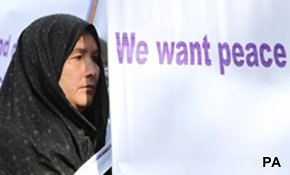Two thirds of Britons do not agree that women’s freedoms should suffer in bid for region’s peace
Ensuring democracy survives, preventing terrorism and developing the economy should be the most important priorities for the Afghan government after allied troops leave Afghanistan, but they should not come at the expense of women’s rights, our poll of almost 2,000 British adults for charity Women for Women International has found.
- Asked which three options should be the highest priorities for the Afghan government once allied troops depart, 60% of Britons said ensuring the survival of democracy was paramount
- 51% said preventing terrorism should be a top priority, followed by 38% who said that economic development was most important, and 31% who favoured investment in education as one of their three primary concerns
- Compared to 29% who felt that upholding women’s rights should be one of three high priority tasks
However, when we asked specifically about women’s rights in relation to peace, the results were clear.
- 74% thought that women’s rights should not be sacrificed in efforts to secure peace in Afghanistan (13% did not agree)
- 70% did not agree that a state that places restrictions on women’s freedoms is an acceptable price to pay for peace (versus 17% who disagreed that women’s rights shouldn’t be sacrificed for peace)
- 55% felt that there would be a ‘greater chance of peace’ if women were more involved in the political process, while 25% thought it would make no difference, and 6% actively thought there would be a lesser chance of peace
Protection in peace
The results come in light of this Monday’s conference on the withdrawal of troops from Afghanistan. Women’s groups, including that led by Selay Ghaffar, executive director of Humanitarian Assistance for the Women and Children of Afghanistan and prominently highlighted in the Guardian newspaper yesterday as a key spokesperson for the protection of women’s rights in the region, are keen to ensure that freedoms gained in the past decade are not lost in the struggle for peace.
Ghaffar called the recent conference ‘a formality’ when it comes to women’s issues, and is sceptical over the extent to which women are being listened to. A recent UN report on the issue also reportedly warned that despite women’s legal position having improved in past years, their interests have not always adequately represented in contentious situations.
‘Honest commitments’
‘The biggest fear we have right now is reconciliation with the Taliban,’ Ghaffar told the Guardian ahead of yesterday’s talks. ‘Will women play a role in these discussions? Will women's rights be part of the negotiations?
The conference sparked debate within the House of Commons over the effect that women’s freedom, education and prosperity levels have on overall progress and success of aid programmes, while ministers also highlighted the potential dangers of returning to a Taliban-controlled region. In a parliamentary debate, MP Margot James argued that ‘the absolute denial of any form of justice to women under the Taliban is what provokes the greatest fear about the possible return of its rule to parts of the country’.
For her part, Selay Ghaffar is certain. ‘We want honest commitments from the Afghan government and the international community that democracy, human rights and women's rights will be delivered’, she said.









